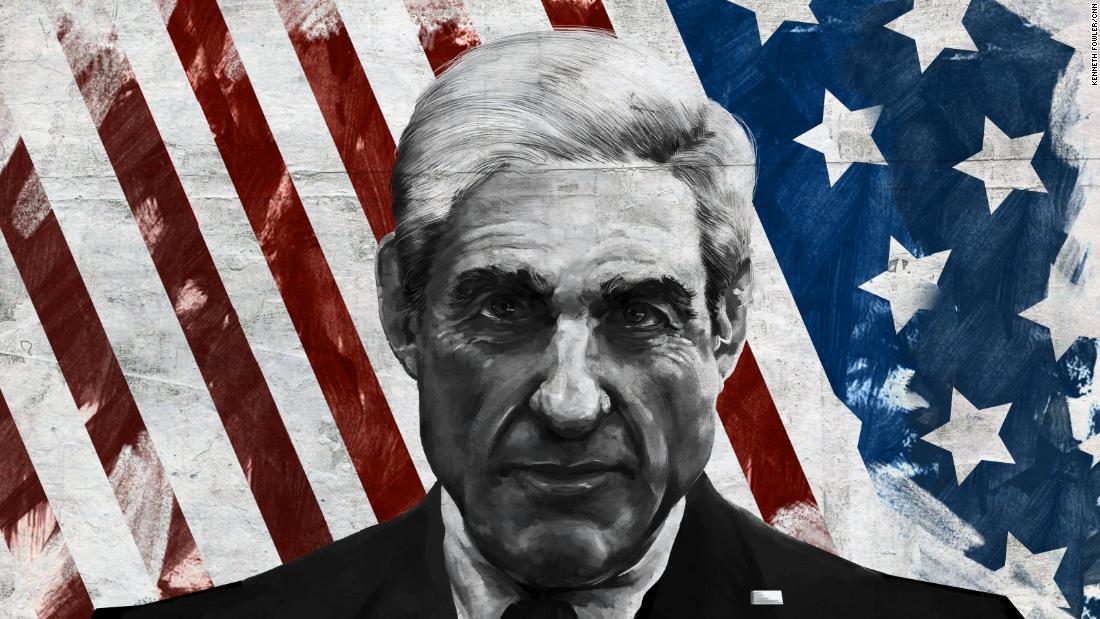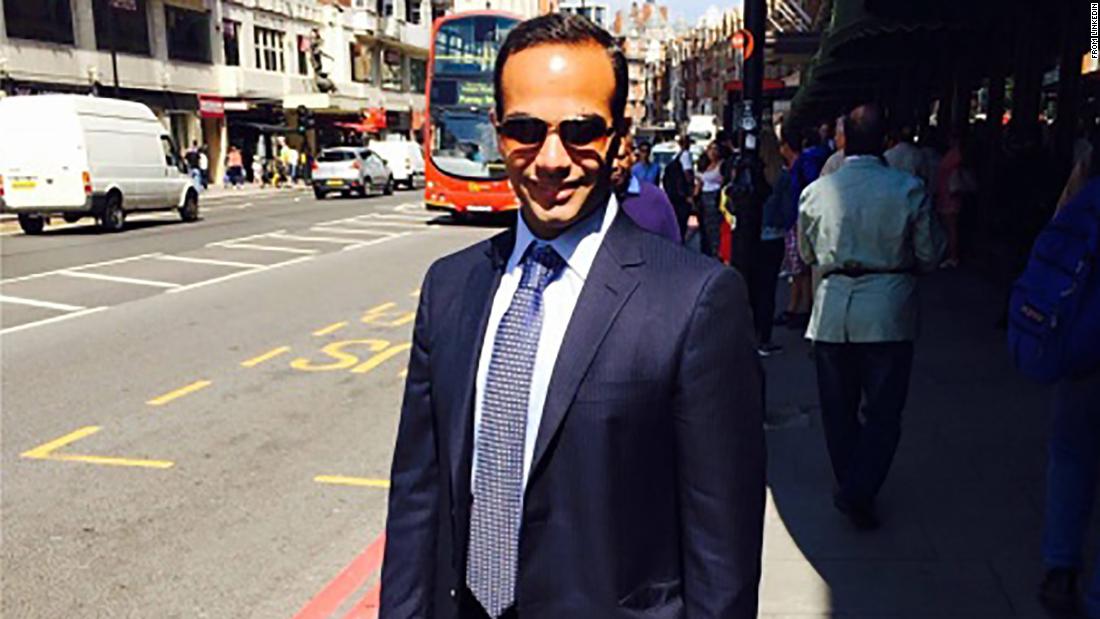
(CNN)Justice Department special counsel Robert Mueller’s one-two punch on Monday sent a forceful message to President Donald Trump, the public and potential suspects about the case he is constructing of Trump associates’ involvement with Russia during the 2016 campaign.
Mueller showed he can keep a secret and maximize the impact of what he makes public.
In the first major filings of his investigation into the Russian effort to influence the election, Mueller revealed how broadly he has taken his mandate, the kinds of records he has uncovered, and how he has leveraged at least one insider to cooperate.
His double-barrel strike was likely more potent than releasing on two different days the indictment related to former campaign chairman Paul Manafort and former Trump campaign official Rick Gates, and the plea deal of George Papadopoulos.
“There’s a ‘large scale ongoing investigation of which this case is a small part,'” Aaron Zelinsky of the special counsel’s office said during Papadopoulos’ sentencing hearing earlier this month, according to a transcript unsealed Monday.
Mueller’s team appears to be making its case to the public, too. In the documents released Monday, evidence is laid out in attention-getting detail, with tantalizing quotes (“Great work,” a campaign supervisor tells Papadopoulos).
The documents point up the fact that the Trump campaign was aware early in 2016 of offers of “thousands” of potentially damaging emails about Democrat Hillary Clinton.
There is an implicit warning to potential additional defendants about trying to hide evidence and a “we’ve got more” suggestion throughout. The Papadopoulos statement opened with the observation that it does not “constitute all the facts known” and then referred to conversations he had with multiple high-ranking (unnamed at this point) campaign officials.
The timing of the rollout may also have thrown the White House. Manafort was pictured walking into FBI offices in Washington as he and Gates were indicted. The President barely had had time to assert on Twitter that the indictment of Manafort and Gates was unrelated to his campaign when the Papadopoulos news went public.
The guilty plea details how the 30-year-old former campaign foreign policy adviser lied to federal investigators about his interactions with foreign officials close to the Russian government. Papadopoulos falsely described the facts surrounding interactions with a foreign contact regarding possible “dirt” on Clinton, Republican Trump’s opponent in the race for the White House.
Mueller’s methodical process
Mueller, a former FBI director first appointed by Republican President George W. Bush in 2001 and continued under Democratic President Barack Obama, was named the Russia special counsel on May 17. Attorney General Jeff Sessions has recused himself from Russia-related matters, and Deputy Attorney General Rod Rosenstein made the appointment after Trump fired then-FBI director James Comey, who previously oversaw the Russia investigation.
As laid out by Rosenstein, Mueller is investigating any links or coordination between the Russian government and the Trump campaign as well as “any matters that arose or may arise directly” from the investigation and any attempts to interfere with it, such as perjury, obstruction of justice and the destruction of evidence.
The indictment of Manafort and Gates shows that Mueller is going back more than a decade to potential wrongdoing unrelated to the election but connected to Russia. The 31-page, 12-count indictment relates to their political consulting on behalf of Russian-backed officials in Ukraine. It asserts conspiracy against the United States, conspiracy to launder money, and failure to register as an agent of a foreign principal, among other charges.
The indictment alleges lavish spending from the offshore accounts, including to pay for mortgages, children’s tuition and home decorating. It also documents some of the evidence retrieved from Manafort’s Virginia home when federal agents made a pre-dawn raid.
Manafort and Gates have pleaded not guilty to the charges.
Papadopoulos, on the other hand, entered a guilty plea after federal officials caught him lying about his interactions with a “foreign contact who discussed ‘dirt’ related to emails concerning” Clinton.
The plea statement lists Papadopoulos’ initial falsehoods and his efforts to cover his tracks once the FBI questioned him. He shut down his Facebook account the day after an interview. It had contained information about his communications with Russian nationals. He also stopped using his usual cell phone number and got a new one.
It turned out Papadopoulos had multiple email exchanges in an effort to arrange a meeting between Trump campaign operatives and Russians. “It’s history making if it happens,” Papadopoulos wrote enthusiastically in one email.
The 13-page plea document unsealed on Monday highlights Papadopoulos’ connection to the Trump campaign, noting at one point that the campaign told The Washington Post in March 2016 that Papadopoulos was one of five named foreign policy advisers.
A month later, he met with a contact identified as “the professor” for breakfast at a London hotel. The professor had just returned from Moscow, where he apparently met with high-level Russian officals and learned that they had “dirt” on Clinton. Papadopoulos initially tried to claim that the interactions with “the professor” occurred before he was on the Trump campaign.
No leaks
In a town where everything leaks, Mueller was also able to keep Papadopoulos’ cooperation and plea deal under wraps.
Papadopoulos was arrested on July 27 at Dulles International Airport. Mueller noted that Papadopoulos then met with the government “on numerous occasions.” He was arraigned and pleaded guilty in federal court October 5, a fact only unsealed Monday.
The secrecy is a testament to the control Mueller has retained over the unfolding story — and a warning to anyone who thinks he or she is safe.
The extent of what Papadopoulos revealed may become evident in upcoming weeks, and Mueller’s team argued as part of a motion to seal his case that his “arrest and the accompanying criminal charges may alert other subjects to the direction and status of the investigation.”
The document released Monday already reveals many possible lines of inquiry. Responding to an email related to Russian efforts to meet with Trump himself, a campaign official says, “Let[‘]s discuss. We need someone to communicate that DT is not doing these trips. It should be someone low level in the campaign so as not to send a signal.”
That ambiguous statement about not sending “a signal” is revealed in a footnote; it feels more like a cliffhanger.
Read more: www.cnn.com















![[Video] How to get rid of bed bugs in Toronto](https://www.thehowtozone.com/wp-content/uploads/2019/10/maxresdefault-2-100x70.jpg)


